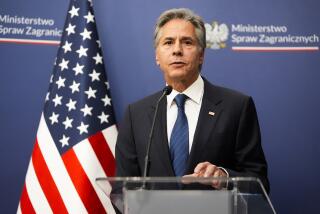Don’t pay a free press
- Share via
THE GANG THAT COULDN’T shoot straight is firmly ensconced in Washington. The State Department trains Iraqi journalists how to be independent and fair; at the same time, the Defense Department contracts with an organization that secretly pays Iraqi publications to print stories making the American occupiers look good.
As often happens with propaganda, when daylight exposes the secret, the stench is overpowering.
Response to this week’s Times disclosure of the multimillion-dollar program has been inconsistent. Sen. John Warner (R-Va.), chairman of the Senate Armed Services Committee, hit the right note in the beginning. “A free and independent press is critical to the functioning of a democracy,” Warner said at first. But on Friday the senator told Associated Press: “Things like this happen. It’s a war.”
“Things like this” should not happen. The claim that we do it because the other guys do it is as invalid now as it is for a second-grader justifying his mischief.
Even if the payoffs don’t violate the law, they violate ethics. Iraqis deserve newspapers, magazines and television broadcasts that tell them what is happening in their country in, shall we say, a fair and balanced way, without fear or favor.
Spokesman Scott McClellan said the White House was “very concerned” about reports of the payoffs and was seeking more information from the Pentagon. There’s no need to ask Army Maj. Gen. Rick Lynch, who said Thursday in Baghdad that U.S. commanders don’t lie and don’t need to but that Al Qaeda leader Abu Musab Zarqawi always lies.
But it is a corruption of a free society to print stories as if they come from legitimate news agencies when they are actually the work of men and women in the pay of a government.
The propaganda campaign also contradicts Defense Secretary Donald H. Rumsfeld’s praise for an Iraqi “free media” this week as a success story after the ouster of Saddam Hussein. The planting of stories is more in line with the Pentagon’s Office of Strategic Influence, created in 2001 and closed a year later after reports that it intended to plant false news stories in the international news media.
In today’s Iraq, soldiers write stories that hail American successes and are translated into Arabic, after which a Washington-based company called the Lincoln Group places them in newspapers.
In decades past it wasn’t unknown for some American journalists to get payoffs from people they reported on; in “The Godfather” movie, a mobster is told to pass information to journalists on the Corleone payroll.
Journalists in some developing countries still are paid by people they cover. But Iraqi journalists should be allowed to skip the corruption stage and proceed to the ethically upright level, giving all sides of a story and labeling advertisements for what they are. That lets readers judge what they see without a hidden hand on the scales.
More to Read
Get the L.A. Times Politics newsletter
Deeply reported insights into legislation, politics and policy from Sacramento, Washington and beyond. In your inbox twice per week.
You may occasionally receive promotional content from the Los Angeles Times.










